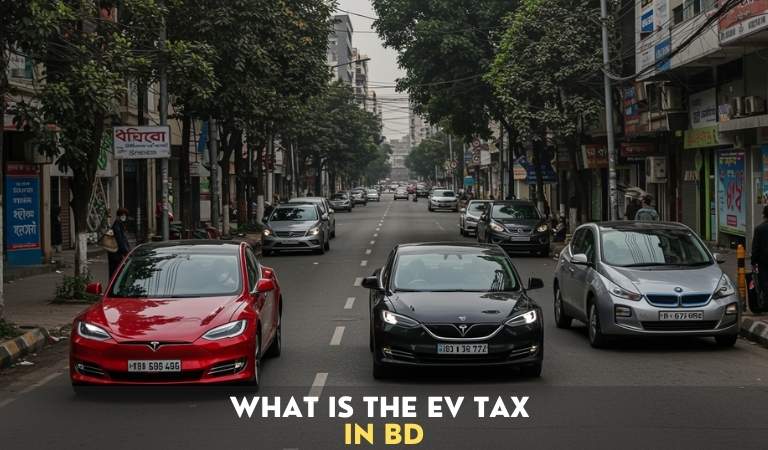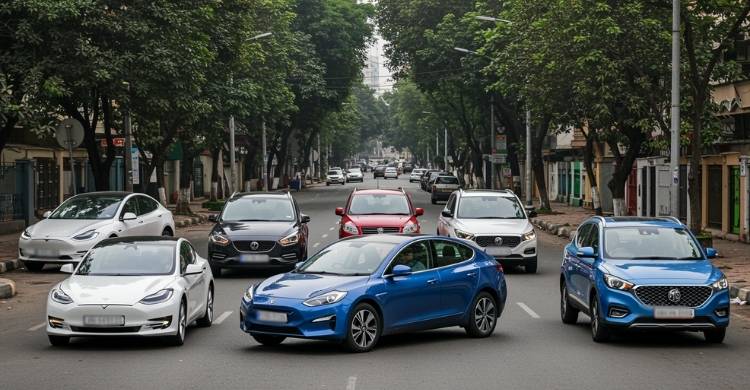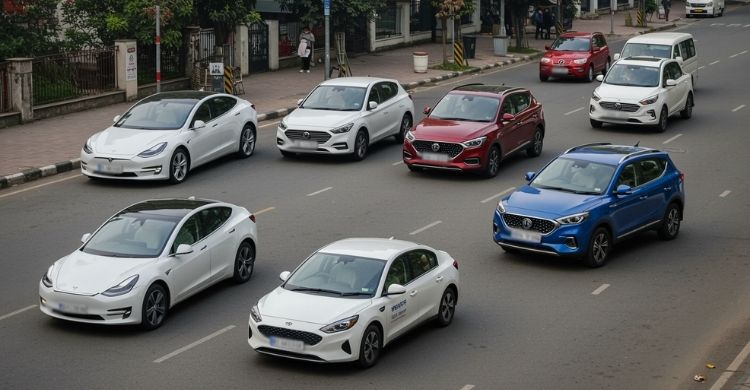A few years ago, electric vehicles were a rare sight on the streets of Bangladesh. Nowadays, they’re becoming a symbol of progress—quiet, efficient, and eco-friendly. As more people consider making the switch from traditional fuel-powered cars to EVs, one important question keeps coming up: What is the EV Tax in BD?
The EV tax in Bangladesh is a government tax on electric vehicles. It includes import duties, VAT, and supplementary duties. The import duty rate is 89%, including a 20% supplementary duty. Registration fees are based on motor capacity, similar to regular vehicles. These taxes are kept lower compared to traditional cars to encourage eco-friendly transportation.
If you’re thinking about going electric or just curious about how much tax you’ll pay on an EV, read on—we’ve broken down everything you need to know.
What Is the EV Tax in BD?
Electric vehicles are becoming more popular in Bangladesh because they help reduce pollution and save fuel. When you buy an electric vehicle, you need to pay some taxes, called the EV tax in BD. This tax includes import duties, VAT, and supplementary duties charged by the government. The good news is that these taxes are usually lower than those for regular gasoline or diesel cars.

The EV tax in BD helps encourage people to use electric vehicles by making them more affordable. This lower tax rate supports cleaner air and helps protect the environment. Along with the EV tax, there is a growing network of electric vehicle charging station in Bangladesh, making it easier to own and operate EVs. Together, these changes make electric vehicles a better choice for many drivers.
Understanding the EV tax is important before deciding to buy an electric vehicle. It affects the overall cost you will pay when importing or buying an EV. With lower taxes, electric vehicles become more attractive and accessible to many people in Bangladesh. If you want a cleaner and cheaper way to travel, knowing about the EV tax in BD is a helpful first step. Below are some common EV Tax policies in Bangladesh:
- Import Duty: Electric vehicles are subject to an import duty of 25%, which is lower compared to traditional internal combustion engine vehicles.
- Supplementary Duty: A supplementary duty of 20% is applied to electric vehicles, contributing to the overall tax burden on EV imports.
- Value Added Tax (VAT): A 15% VAT is levied on electric vehicles, calculated on the total value after adding import and supplementary duties.
- Advance Income Tax (AIT): An advance income tax of 5% is imposed on the import value of electric vehicles, payable at the time of import.
- Advance Trade VAT (ATV): An advance trade VAT of 3% is charged on electric vehicles, based on the VAT-imposable value.
- Regulatory Duty (RD): A regulatory duty of 3% is applied to electric vehicles, calculated on the assessable value of the imported vehicle.
- Total Tax Incidence (TTI): The combined effect of all duties and taxes results in a total tax incidence of approximately 89% on electric vehicles.
- Registration Fees: Electric vehicles are subject to registration fees similar to those of conventional vehicles, without any specific exemptions.
- Charging Infrastructure: The government is promoting the establishment of electric vehicle charging stations in Bangladesh to support EV adoption.
- Incentives for Local Manufacturing: Policies are in place to encourage local manufacturing of electric vehicles, including tax holidays and financial incentives.
EV vs. Traditional Car Taxes in Bangladesh: What’s the Difference?
Buying a car in Bangladesh comes with several taxes, but the type of vehicle you choose makes a big difference. Electric vehicles are often taxed at lower rates to encourage eco-friendly choices. Below is a table comparing EV and traditional car taxes across key areas:
| Tax Component | Electric Vehicles (EVs) | Traditional Fuel Cars |
| Import Duty | 25% | Up to 100% |
| Supplementary Duty | 20% | Up to 200% |
| Value Added Tax (VAT) | 15% | 15% |
| Advance Income Tax (AIT) | 5% | 5% to 10% |
| Advance Trade VAT (ATV) | 3% | 3% |
| Regulatory Duty (RD) | 3% | 5% to 15% |
| Registration Fee | Similar to traditional cars | Standard registration fees |
| Fuel Cost Impact | Very low (electricity-based) | High (petrol or diesel-based) |
| Maintenance Cost | Lower due to fewer moving parts | Higher due to engine and transmission upkeep |
| Environmental Tax Incentive | Eligible for future benefits and tax rebates | Not eligible for green incentives |
Could Lower Taxes Make EVs More Acceptable in BD?
Yes, lower taxes could make EVs more acceptable in BD by reducing costs and making them affordable for more people across the country. Right now, many people avoid EVs because they think the price is too high. Lowering taxes can change this and give buyers more confidence to switch. When people see savings, they are more likely to choose electric vehicles over fuel-based ones.

EVs offer a clean and cost-saving way to travel, which is ideal for a growing country like Bangladesh. With reduced taxes, even middle-income families can start considering EVs as their next car. The future of EVs in Bangladesh depends on smart pricing and good support from the government and businesses. Cheaper costs can help EVs move from being rare to being normal on the streets.
Lower taxes alone may not solve everything, but they are a big step toward better adoption of EVs. It is also crucial for buyers to be able to access charging stations easily, receive EV charging service support from trusted providers like Crack Platoon, and purchase reliable vehicles. But when taxes go down, more people will at least start paying attention to EV options. That awareness can drive bigger changes in our habits, choices, and the environment we live in.
How the Government Incentivizes EV Adoption in Bangladesh?
Electric vehicles are becoming more popular in Bangladesh, and the government is doing a lot to help this shift happen faster. There are many ways they are supporting electric cars so more people can buy and use them. These efforts are making EVs a better choice for everyone, especially for daily travel. If you’re wondering how the government is helping with this, keep reading to find out more:
Lower Import Taxes
The government has reduced taxes on electric vehicles when they are brought into the country from abroad. This makes EVs cheaper to buy compared to regular fuel cars. With lower costs, more people can now think about owning an electric car. It’s one of the main steps the government has taken to support clean travel. Cheaper EV prices mean more people will choose them.
Support for Charging
Electric vehicles need charging stations, and the government is helping build more of them around the country. This makes it easier for people to drive EVs without worrying about where to charge. Some stations are already working, and more are on the way. The goal is to make charging as easy as filling up with petrol. Easy charging will make EVs more common.
Encouraging Local Production
The government wants companies to build electric vehicles in Bangladesh instead of always buying them from outside. This will make EVs even more affordable for local people. It also creates new jobs and supports the economy. Some local companies have already started working on EV models. Making EVs here will help more people get access to them.
Special Loans and Support
To help people buy electric cars, the government is working with banks to give easy loans and financial help. These loans have lower interest rates and longer payment times. That way, even if someone can’t pay all at once, they can still buy an EV. This makes it possible for more people to go electric. Easier buying options mean more EV users.
Awareness Campaigns
The government is also helping people understand why electric vehicles are a good choice. They are using TV, radio, and events to explain the benefits. When people learn how EVs save money and reduce pollution, they are more open to using them. These messages are easy to understand and are made for everyone. Knowing more helps people make better choices.
Future Plans
More help is coming soon as the government keeps planning for better roads, better EV models, and more charging spots. They want to see more EVs on the road in the next few years. These steps show a clear push for a cleaner future. The government is serious about making electric vehicles part of daily life. If you’re thinking about EVs, now’s a great time to learn more.
Do All EV Brands in Bangladesh Get Equal Tax Treatment?
No, not all EV brands in Bangladesh get the same tax treatment, and that can affect prices and choices for buyers. Some brands may get better rates due to where they’re made or how they’re imported. Local partnerships and assembly can also help reduce the overall tax. Because of this, the cost of EVs may vary even if the models look similar.

A few well-known brands get better support as they have local connections or government agreements. This makes their cars cheaper and easier to find. Some smaller or new brands might face higher costs and longer import times. Buyers should always check what taxes apply before choosing a brand or model.
It’s also important to know that brands offering the Top EVs in Bangladesh often work closely with local suppliers and dealers. That helps them keep prices low and service easy to access. People trust these brands more because they are more visible and offer good support. Knowing these small differences helps you make a smarter choice when buying your first EV.
Commonly Asked Questions
Electric vehicles are making a big impact on the streets of Bangladesh, and with that comes a lot of questions. People want to know more about the costs, the tax process, and what it means to own an EV in BD. To make things easy, here are answers to some of the most common questions about the EV tax in Bangladesh.
How Does the EV Tax Affect the Price of Electric Cars in Bangladesh?
The EV tax directly influences the price you pay when buying an electric car in Bangladesh. Since EV tax rates are lower than those on regular cars, electric vehicles often cost less than similar-sized petrol or diesel cars. This price difference helps make EVs more attractive to buyers.
Can Importers Get Any Special Benefits When Bringing EVs to Bangladesh?
Yes, importers of electric vehicles in Bangladesh can sometimes receive special benefits, such as reduced duties or support for importing spare parts. These advantages make it easier and more affordable for businesses to offer a range of EV models to customers.
Are EV Batteries Taxed Separately in Bangladesh?
EV batteries may face their own import duties and taxes, depending on how they are brought into the country. Sometimes, these parts are taxed separately, but they often benefit from the same lower tax rates as the rest of the electric vehicle.
Do Used Electric Vehicles Have Different Tax Rates?
Used electric vehicles are taxed differently compared to new ones. Sometimes, older EVs might be subject to slightly higher rates, or certain exemptions may not apply. Buyers should always check the latest rules before importing or purchasing a used EV.
What Happens if an EV Owner Upgrades Their Car with New Features?
If you add significant new features or upgrade your electric car, it might affect the taxable value. Sometimes, these upgrades can lead to higher registration fees or additional taxes, so it’s best to check before making big changes.
Are Electric Motorcycles and Scooters Taxed Like Electric Cars?
No, electric motorcycles and scooters usually have their own tax rates and rules, which are often lower than those for electric cars. This makes two-wheeler EVs even more affordable for people who want to try electric transport.
Do EV Owners Need to Pay Road Tax in Bangladesh?
Yes, all electric vehicle owners must pay road tax, just like traditional car owners. The amount might be the same or slightly different, but it is a standard requirement for registering and using any vehicle on Bangladeshi roads.
How Do Seasonal Government Announcements Affect EV Tax Rates?
The government sometimes updates tax rates and incentives for electric vehicles during the annual budget or special announcements. These changes can impact the total price of EVs, so it’s a good idea to stay informed about the latest news.
Bottom Line
Thinking about switching to an electric vehicle? You’re not alone—more people in Bangladesh are now looking at EVs as a smart, clean choice. But before you make the move, understanding the costs, especially the tax, is a big part of the decision.
So, what is the EV tax in BD? It’s a mix of duties like import, VAT, and others, but they’re lower than what you’d pay for regular cars. This difference in tax makes EVs more affordable and encourages people to go green while saving money in the long run.
As the government continues to support electric mobility, now might be the perfect time to explore your options. Whether you’re just curious or seriously planning to buy, knowing the EV tax helps you make a better, budget-friendly choice.
